跨文化交际Unit4
- 格式:pptx
- 大小:419.56 KB
- 文档页数:15
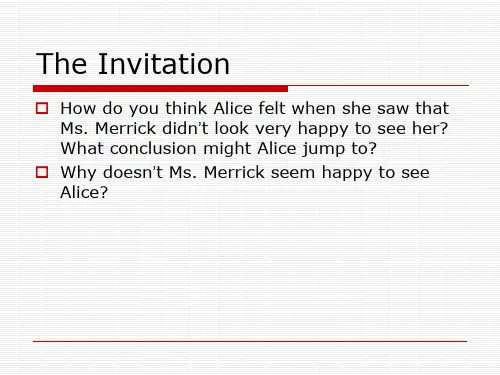
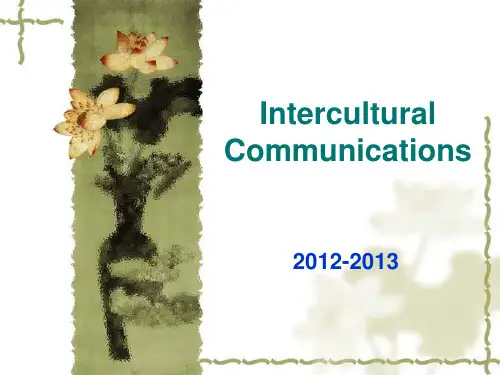
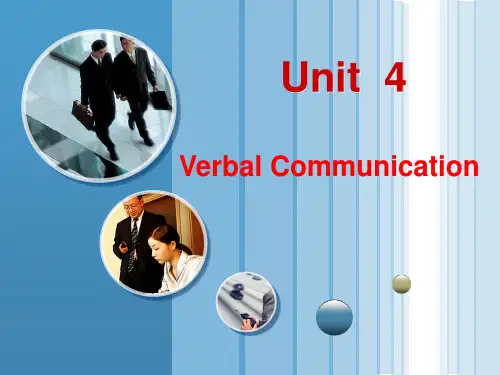
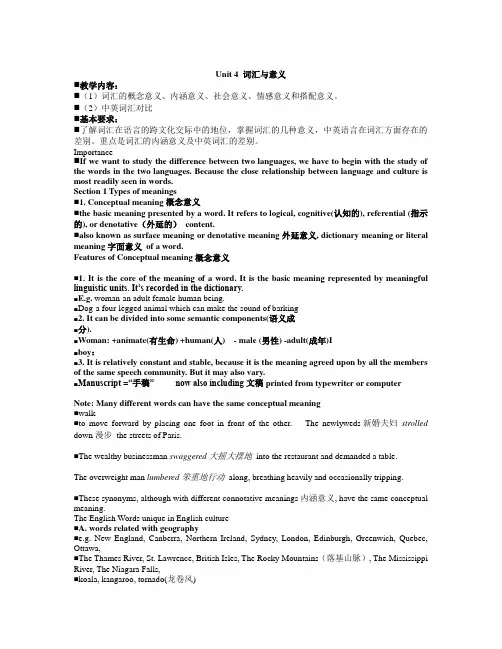
Unit 4 词汇与意义⏹教学内容:⏹(1)词汇的概念意义、内涵意义、社会意义、情感意义和搭配意义。
⏹(2)中英词汇对比⏹基本要求:⏹了解词汇在语言的跨文化交际中的地位,掌握词汇的几种意义,中英语言在词汇方面存在的差别。
重点是词汇的内涵意义及中英词汇的差别。
Importance⏹If we want to study the difference between two languages, we have to begin with the study of the words in the two languages. Because the close relationship between language and culture is most readily seen in words.Section 1 Types of meanings⏹1. Conceptual meaning概念意义⏹the basic meaning presented by a word. It refers to logical, cognitive(认知的), referential (指示的), or denotative(外延的)content.⏹also known as surface meaning or denotative meaning外延意义, dictionary meaning or literal meaning字面意义of a word.Features of Conceptual meaning概念意义⏹1. It is the core of the meaning of a word. It is the basic meaning represented by meaningful linguistic units. It’s recorded in the dictionary.⏹E.g. woman-an adult female human being.⏹Dog-a four-legged animal which can make the sound of barking⏹2. It can be divided into some semantic components(语义成⏹分).⏹Woman: +animate(有生命) +human(人) - male (男性) -adult(成年)I⏹boy:⏹3. It is relatively constant and stable, because it is the meaning agreed upon by all the members of the same speech community.But it may also vary.⏹Manuscript =“手稿” now also including文稿printed from typewriter or computer Note: Many different words can have the same conceptual meaning⏹walk⏹to move forward by placing one foot in front of the other. The newlyweds新婚夫妇strolled down漫步the streets of Paris.⏹The wealthy businessman swaggered大摇大摆地into the restaurant and demanded a table.The overweight man lumbered笨重地行动along, breathing heavily and occasionally tripping.⏹These synonyms, although with different connotative meanings内涵意义, have the same conceptual meaning.The English Words unique in English culture⏹A. words related with geography⏹e.g. New England, Canberra, Northern Ireland, Sydney, London, Edinburgh, Greenwich, Quebec, Ottawa,⏹The Thames River, St. Lawrence, British Isles, The Rocky Mountains(落基山脉), The Mississippi River, The Niagara Falls,⏹koala, kangaroo, tornado(龙卷风)⏹The Great Barrier Reef, Silicon Valley, Yellowstone Park,⏹Summary:All these have their own geographical features: places, plants and animals uniquely found in USA, Great Britain and Australia; They all represent meaning unique in their own cultures;Their Chinese equivalents are only used by the Chinese people as mere names, which have lost their distinctive geographical and cultural features.The English Words unique in English culture⏹A. words related with geography⏹e.g.⏹U.S.A: New England, The Rocky Mountains,The Mississippi River, The Niagara Falls,Yellowstone Park, Silicon Valley⏹Britain: British Isles, Northern Ireland, London, Edinburgh, Greenwich, The Thames River, Rose⏹Canada: Ottawa, Quebec, St. Lawrence,⏹Australia: Canberra, Sydney, The Great Barrier Reef, koala, kangaroo⏹B. words and history⏹the May Flower⏹(the ship in which a group of⏹British Puritans who were also⏹known as pilgrim fathers sailed to⏹America in 1620.⏹The revolutionary war⏹( the struggle of the 13 colonies in North America for independence from the British rule between 1775-1783)⏹Scalp(头皮)⏹(to tear the skin on the top and back of head and the hair attached from an enemy by an North American Indian as a trophy战利品)⏹⏹Knight⏹(a man given the rank of knighthood by the British Monarch in recognition of merits in public service)⏹Hippy/Hippie⏹(a young man and young woman who rejects authority, existing institutions and conventional attitudes towards morality, style of dress, etc.)⏹C. word and politics⏹USA: President, Secretary, Congress, Senate, the House of Representatives, The Democratic Party, The Republican Party, the Supreme Court⏹Great Britain: Parliament议会:the supreme legislative body of the United Kingdom. It comprises the sovereign, the House of Lords and the House of Commons.议会两院尤指英国由上议院和下议院构成的国家立法机关; Prime Minister, The Conservative Party, The Labour Party, Supreme Court of Judicature司法⏹Governor行政长官⏹the official title of the representative of the British monarch in a British colony.⏹Governor general总督⏹the personal representative of the British crown in the independent nations of the commonwealth.⏹e.g. The Canadian Governor General⏹Constitutional monarchy君主立宪制⏹a monarchy in which the powers of the rulers are restricted to those granted under the constitution and laws of the nationD. words and religion⏹Bible⏹a collection of religious books comprising the Old Testament and New Testament⏹reformation:宗教改革⏹a 16th century religious movement against the abuses in the Roman Catholic Church, ending in the formation of Protestant Churches.⏹Christmas box耶诞礼物或礼金⏹money given at Christmas time to the dustmen and others who provide a service throughout the year.⏹Boxing day节礼日⏹the first week day after Christmas, a legal holiday in England⏹Easter⏹the chief Christian feast, which celebrates the Resurrection of Christ, on the first Sunday after the full moon that coincides with or comes after the spring equinox.E. words and HolidaysChristmas cake/pudding/card/tree/carol/stockingFather Christmas), Santa Claus(A)⏹F. words and currency⏹Pound, penny; the American dollar, cent, quarter, nickel⏹G. Words and law⏹Court, judge, jury, lawyer, attorney (A)⏹H. Words and way of life⏹Snack Bar, roast beef, hamburger, sandwich, barbecue, cocktail, champagne; pajamas, suite, dress; subway, Greyhound bus; drive-ins, diner,⏹I. words and sports⏹Football, soccer, rugby, hockey, cricket⏹J. words and sex⏹Striptease, sex store, sexual interference, prostitute, whorehouse⏹K. words and personality⏹GB: reserve, practical, insularism偏执⏹USA:individualism, rapid pace of life, direct, promptness, informality, originality, materialism English works partly corresponding with Chinese words in conceptual meaning⏹1. Intellectual--知识分子⏹2. social sciences--社会科学⏹3. drugstore--药店⏹[美]杂货店(出售药物、糖果、饮料,化妆品,杂志及其他杂物的店铺)⏹4. Morning=午夜+凌晨+黎明+早晨+上午⏹5. Young(18-40), middle-aged(40-60), old (over 60)-------老中青⏹Discussion: discuss the conceptual differences between the words in each pair⏹yard--院子⏹peasant--农民⏹idealist-唯心主义者⏹materialist--唯物主义者"family" and jiating (家庭)⏹An American (A) attended her Chinese friend's (B) wedding. Two years later, the two met again.⏹A: Have you started a family'!⏹B: Oh, yes. You attended my wedding, remember?⏹A: I mean if you've had children.⏹Here we see that ' family' means more than jiating (家庭) ,though they seem to be equivalents.2. Connotative meaning内涵意义⏹the implication(含义,暗示)of words, apart from its primary meaning.It is the communicative value that an expression has in addition to the purely conceptual meaning. It varies from culture to culture and from individual to individual⏹E.g. Woman⏹Physical: biped(双足的), having a womb(子宫)⏹Personality: gentle, compassionate, sensitive, hard-working, frail脆弱的, emotional, prone to tears, irrational, inconstant变化无常的,subject to maternal instinct, behavior: capable of speech, experienced in cookery, skirt or dress wearing,⏹Dog⏹loyal to owner, fierce凶猛的, violentFeatures of Connotative meaning内涵意义⏹1. Despite cultural background difference, some corresponding words in two languages may convey the same connotative meaning. e.g tiger, 老虎--cruelty⏹E.g. Woman⏹2. words with the same conceptual meaning yet different connotative meaning⏹书, book⏹老,old⏹同志,comrade⏹宣传,propaganda⏹狗,dogConnotative meanings vary according to different people, times, ages, societies etc.⏹E.g. Home: warm, loving, comfortable, safe⏹like a prison, cold, boring⏹终身大事⏹工作?事业?婚姻? 生死?⏹Connotative meaning may change with the times going⏹E.g. traditional: positive in the past⏹“old, conservative” at present⏹3. Social meaning社会意义⏹Social meaning is what a piece of language conveys about the social circumstances of its use, such as the language users( who are using the language), settings (where is language used), topics (what are language users are talking or writing).⏹E.g⏹home (general) , residence (formal), domicile(law), abode (literature),⏹horse, steed(战马), nag(老马),gee-gee(child)⏹throw(general) , cast (literature and religious), chuck(slang)⏹salt, sodium chloride⏹disobedient, recalcitrant反抗的⏹A good selection of words is important.Exercise!⏹Words which stand for what people do in order to make a living: job, vocation, profession, occupation, career, trade, work⏹Profession (an occupation requiring special education, especially in the liberal arts or sciences)所指的职业是需要在文科或理科方面有一定的教育程度,具备一定理论水平的人才的职业。
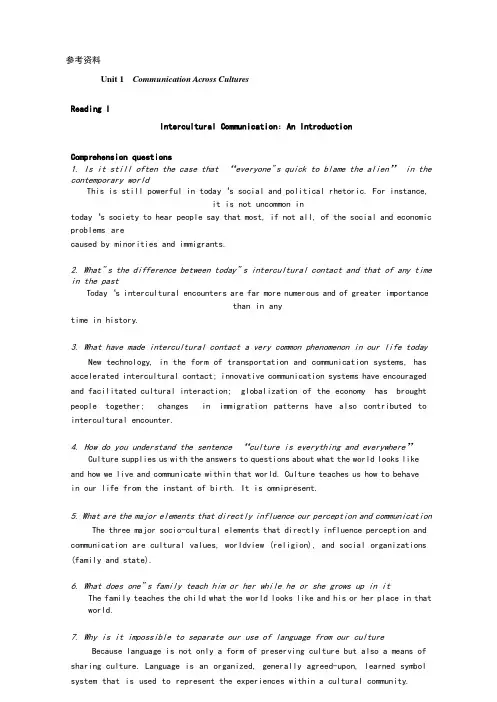
参考资料Unit 1 Communication Across CulturesReading IIntercultural Communication:An IntroductionComprehension questions1. Is it still often the case that “everyone‟s quick to blame the alien” in the contemporary worldThis is still powerful in today‘s social and political rhetoric. For instance,it is not uncommon intoday‘s society to hear people say that most, if not all, of the social and economic problems arecaused by minorities and immigrants.2. What‟s the difference between today‟s intercultural contact and that of any time in the pastToday‘s intercultural encounters are far more numerous and of greater importancethan in anytime in history.3. What have made intercultural contact a very common phenomenon in our life todayNew technology, in the form of transportation and communication systems, has accelerated intercultural contact; innovative communication systems have encouraged and facilitated cultural interaction; globalization of the economy has brought people together; changes in immigration patterns have also contributed to intercultural encounter.4. How do you understand the sentence “culture is everything and everywhere”Culture supplies us with the answers to questions about what the world looks like and how we live and communicate within that world. Culture teaches us how to behavein our life from the instant of birth. It is omnipresent.5. What are the major elements that directly influence our perception and communicationThe three major socio-cultural elements that directly influence perception and communication are cultural values, worldview (religion), and social organizations (family and state).6. What does one‟s family teach him or her while he or she grows up in itThe family teaches the child what the world looks like and his or her place in that world.7. Why is it impossible to separate our use of language from our cultureBecause language is not only a form of preserving culture but also a means of sharing culture. Language is an organized, generally agreed-upon, learned symbol system that is used to represent the experiences within a cultural community.8. What are the nonverbal behaviors that people can attach meaning toPeople can attach meaning to nonverbal behaviors such as gestures, postures, facial expressions, eye contact and gaze, touch, etc.9. How can a free, culturally diverse society existA free, culturally diverse society can exist only if diversity is permitted to flourish without prejudice and discrimination, both of which harm all members of the society.Reading IIThe Challenge of GlobalizationComprehension questions1. Why does the author say that our understanding of the world has changedMany things, such as political changes and technological advances, have changed the world very rapidly. In the past most human beings were born, lived, and died within a limited geographical area, never encountering people of other cultural backgrounds. Such an existence, however, no longer prevails in the world. Thus, all people are faced with the challenge of understanding this changed and still fast changing world in which we live.2. What a “global village” is likeAs our world shrinks and its inhabitants become interdependent, people from remote cultures increasingly come into contact on a daily basis. In a ―global village‖, members of once isolated groups of people have to communicate with members of other cultural groups. Those people maylive thousands of miles away or right next door to each other.3. What is considered as the major driving force of the post-1945 globalizationTechnology, particularly telecommunications and computers are considered to be the major driving force.4. What does the author mean by saying that “the …global‟may be more local than the …local‟”The increasing global mobility of people and the impact of new electronic media on human communications make the world seem smaller. We may communicate more with people of other countries than with our neighbors, and we may be more informed of the international events than of the local events. In this sense, ―the ‗global‘ may be more local than the ‗local‘‖.5. Why is it important for businesspeople to know diverse cultures in the worldEffective communication may be the most important competitive advantage that firms have to meet diverse customer needs on a global basis. Succeeding in the global market today requires the ability to communicate sensitively with people from other cultures,a sensitivity that is based on an understanding of cross-cultural differences.6. What are the serious problems that countries throughout the world are confronted withCountries throughout the world are confronted with serious problems such as volatile international economy, shrinking resources, mounting environmental contamination, and epidemics that know no boundaries.7. What implications can we draw from the case of MichaelFayThis case shows that in a world of international interdependence, the ability tounderstand and communicate effectively with people from other cultures takes on extreme urgency. If we are unaware of the significant role culture plays in communication, we may place the blame for communication failure on people of other cultures.8. What attitudes are favored by the author towardsglobalizationGlobalization, for better or for worse, has changed the world greatly. Whether we like it or not, globalization is all but unstoppable. It is already here to stay. It is both a fact and an opportunity. The challenges are not insurmountable. Solutions exist, and are waiting to be identified and implemented. From a globalistic point of view, there is hope and faith in humanity.Translation纵观历史,我们可以清楚地看到,人们由于彼此所处地域、意识形态、容貌服饰和行为举止上存在的差异,而长久无法互相理解、无法和睦相处。
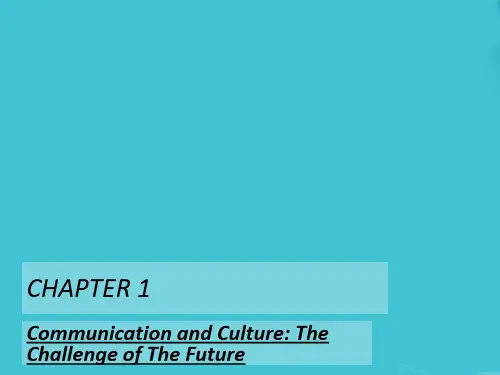
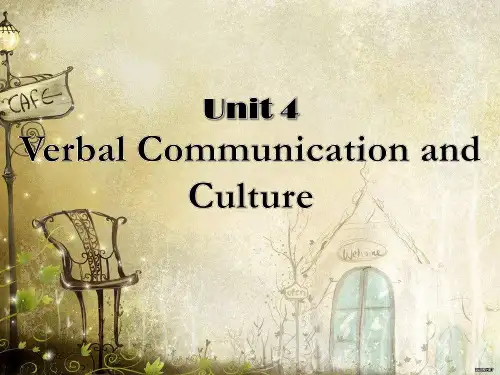
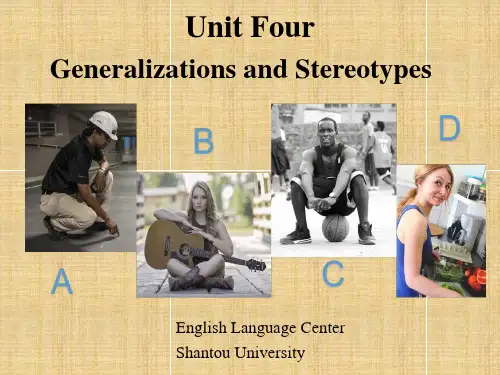
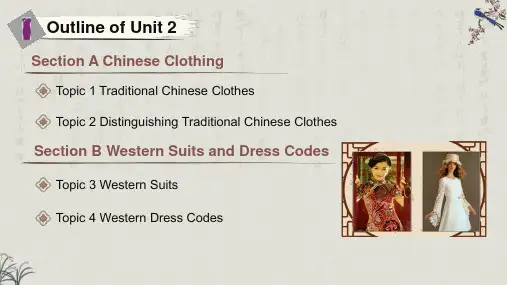

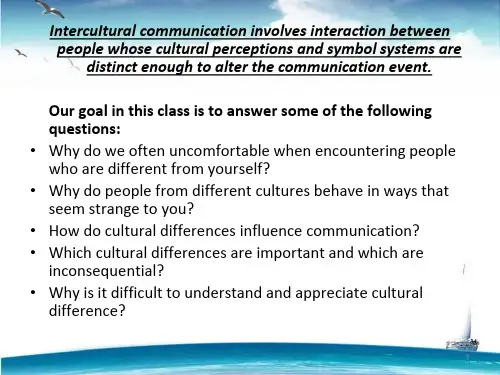
Keys to Unit 4 Alcoholic drinks and drinking cultureSection A Chinese alcoholic drinks and drinking culturePassage 1Reading comprehension1 1 F2 F3 T4 T5 T2 略Verbal expression1 略2 略Critical thinking and cultural exploration1 Chinese liquor vs vodka and whiskyTranscriptVodka is a distilled beverage composed primarily of water and ethanol, sometimes with traces of impurities and flavorings. Traditionally, vodka is made by the distillation of cereal grains or potatoes that have been fermented, though some modern brands use other substances, such as fruits or sugar. Since the 1890s, the standard Polish, Russian, Belarusian, Ukrainian, Estonian, Latvian, Lithuanian and Czech vodkas are 40% alcohol by volume, abbreviated as ABV. The European Union has established a minimum of 37.5% ABV for any “European vodka” to be named as such. Products sold as “vodka”in the United States must have a minimum alcohol content of 40%. Even with these loose restrictions, most vodka sold contains 40% ABV. Vodka is traditionally drunk neat, which means not mixed with any water, ice, or other mixer, though it is often served chilled in the vodka belt countries: Russia, Belarus, Poland, Ukraine, Lithuania, Latvia, Estonia, Sweden, Norway, Finland, and Iceland. It is also commonly used in cocktails and mixed drinks.Whisky is a type of distilled alcoholic beverage made from fermented grain mash. Various grains, which may be malted, are used for different varieties, including barley, corn, rye, and wheat. Whisky is typically aged in wooden barrels, generally made of charred white oak. It is a strictly regulated spirit worldwide with many classes and types. The typical unifying characteristics of the different classes and types are the fermentation of grains, distillation, and aging in wooden barrels.(240 words)2 Baijiu seeking overseas market expansionIn the city of Luzhou in Sichuan, at the confluence of Yangtze and Tuo rivers, is one of the core areas of Chinese alcohol industry.Over 200 liquor products from Luzhou are listed as national and provincial-level products, with many of the producers now attempting to expand overseas.Chinese alcohol, or baijiu, is the most widely consumed spirit in the world, with 5 billion litres sold in 2016.The latest statistics shows baijiu made up nearly 40% of the spirits produced worldwide last year.However, baijiu only makes up 8% of global alcohol sales.Lin Feng, the general manager of Luzhou Laojiao, a well-known Luzhou-based baijiu producer, says foreign markets are still wide-open for Chinese liquor producers, arguing the domestic market is overly saturated.Luzhou Laojiao was the only Chinese alcohol served at the 2018 FIFA World Cup in Russia.Lin Feng says to attract more customers in Russia, the brand integrated Chinese liquor into cocktails to boost sales.“We displayed our liquor products in every box of the stadiums at the World Cup, as well as demonstrating Chinese alcohol culture with some live shows. We especially wanted to use the event to test our cocktail products and see how consumers would accept it. Surprisingly it was so popular that our supply wasn’t even enough.”Lin Feng says Luzhou Laojiao has sped up the internationalization of its brand."For the past two years, we have brought Chinese alcohol to some of the Belt and Road countries and demonstrated our products with multiple promotion activities. Last year, for example, we promoted baijiu in Russia with a special fireworks display at the Red Square. We also did promotions in New York and places in Canada and Australia; this year is focused on South Africa, as well as many European countries like the UK. We have consistently made efforts to show others Chinese alcohol culture and increase overseas consumption."In recent years, not only Luzhou Laojiao, but other Chinese alcohol producers have chosen to be creative, developing new alcohol products.Some are turning to fruit mixed alcohols and health care Chinese wine which are among the favorite items now being generated in an effort to open up the overseas markets.(368 words)Passage 2Reading comprehension1 1 T2 T3 F4 F5 T2 略Verbal expression1 Introducing a game: Rock-paper-scissorsTranscriptRock-paper-scissors is a hand game usually played between two people, in which each player simultaneously forms one of three shapes with an outst retched hand. These shapes are “rock” (a simple fist), “paper”(a f lat hand), and “scissors”(a fist with the index and middle fingers extended, forming a V). The game has only two possible outcomes other than a tie: one of the two players wins, and the other player loses.A player who decides to play rock will beat another player who has chosen scissors because “rock crushes scissors”, but will lose to one who has played paper because “paper covers rock”; a player of paper will lose to a player of scissors because “scissors cut paper”. If both players choose the same shape, the game is tied and is usually immediately replayed to break the tie.Rock-paper-scissors is often used as a choosing method in a way similar to coin flipping, drawing straws, or throwing dice. Unlike truly random selection methods, however, rock–paper–scissors can be played with a degree of skill by recognizing and exploiting non-random behavior in opponents.(183 words) 2 略Critical thinking and cultural exploration1 Changes in the drinking customs in ChinaTranscriptAlcohol can lubricate deal-making and consensus-building around the world, but it seems particularly powerful in China. According to a 2013 China Youth Daily survey, 82% of young Chinese say that drinking is essential for career development.Traditionally, business drinkers in China gather around the dinner table (which means the drinking doesn’t end until the meal is over) and everyone has to make at least one toast. First, the host may make a welcoming toast, followed by different interest groups “cross-toasting” throughout the meal.Yet as China grows and changes, many young people are beginning to reject the intricate etiquette of the professional drinking “game.” In the same China Youth Daily survey, 84% of people also noted that they hate being obliged to drink. Rather than being forced to play along,this new generation wants to write rules of their own. They’re taking drinking cul ture from grandiose restaurants to bars, casual salons, and their living rooms.The old-fashioned business drinking culture, which solidifies the idea of hierarchy, resembles the way Chinese drink at family dinners, where young people are expected to show respect and humility to their older relatives. But the new generation of Chinese adults values personal identity and don’t always follow the rules as their parents did.Qiushi Jin, 24, who runs an e-commerce startup in Hangzhou, a city in eastern China, always meets clients in cafes or at the office instead of at an alcohol-fueled dinner. “The speed of deal-making is faster than ever, especially for e-commerce. Every minute counts. Instead of wasting my time on drinking, I’d rather cut the crap and go straight to real business.” he says.Though the custom is changing, Chinese people aren’t actually drinking less. In fact, the country’s per capita alcohol consumption is increasing. It’s what people drink, where they drink, and why they drink that is changing.(307 words)2 A popular US drinking game: “Never Have I Ever”TranscriptThe verbal game is started with the players getting into a circle. Then, the first player says a simple statement starting with “Never have I ever …” Anyone who at some point in their lives has done the action that the first player says, must drink.Play then continues around the circle, and the next person makes a statement.An additional rule – uncommon, but beneficial to the game – is that if there is no one taking a drink, then the one who said the particular “Never have I ever…” must take a drink. This rule often forces the players to strategize more and makes for less pointless suggestions.A further variation holds that whenever only one person is drinking, that person must give a detailed account of why he or she is drinking. Another variation of this game involves putting up five or ten fingers, putting one down whenever something mentioned has been done. Those who end up putting down all of their fingers must take several successive drinks.Keeping the game afloat with good questions can be challenging. To avoid awkward silences and keep the game going, some of the best “Never Have I Ever” questions are put together below:1) Never have I ever called in sick to work because I was hungover.2) Never have I ever had a near death experience.3) Never have I ever eaten food out of a trash can.4) Never have I ever talked to myself out loud in public.(249 words) Section B Wine and wine etiquettePassage 3Reading comprehension11 F2 F3 F4 F5 F6 F2 略Verbal expression11 Red wines: 1) B2) D 3) C2 White wines: 1) F2) A 3) E21 What’s the best glass?2 What wines should I serve at a party?3 How do I remove labels?4 Should I decant?5 Do I have to store my wine in a temperature-controlled cellar?Critical thinking and cultural exploration1 How basic wine characteristics help you find your favouritesTranscriptThe best way to learn about your taste is to classify wines by their fundamental traits and then pick what you like the best. To understand the basic characteristics of wine it’s important to learn how to taste wine.So by understanding the 5 characteristics below you’ll have a better chance of getting what you love.1 Sweetness: Also known as “Level of dryness”Our perception of sweet starts at the tip of our tongue. Often, the very first impression of a wine is its level of sweetness. To taste sweet, focus your attention on the taste buds on the tip of your tongue. Are your taste buds tingling? It is an indicator of sweetness. Believe it or not, many dry wines can have a hint of sweetness to carry a larger impression of body. If you find a wine you like has residual sugar, you may enjoy a hint of sweetness in your wine.2 Acidity: Wrapping your head around itAcidity in food and drink is tart and zesty. Tasting acidity is often confused with the taste of higher alcohol. It is common for wines grown in cooler vintages to have higher acidity. Wines with higher acidity feel lighter weight. If you prefer a wine that is more rich and round, you enjoy slightly less acidity.3 Tannin: The misunderstood wine characteristicTannin is often confused with level of dryness because tannin dries your mouth. What are wine tannins? Tannin in wine is the presence of phenolic compounds that add bitterness to a wine. So how does tannin taste? Imagine putting a used black tea bag on your tongue. A wet tea bag is practically pure tannin that is bitter and has a drying sensation. Tannin tastes herbaceous and is often described as astringent. While all of these descriptors sound negative, tannin adds balance, complexity, structure and makes a wine last longer.4 Fruit: Identifying different flavorsWines are often characterized by their main fruit flavours. Tasting for fruit flavours in a wine can help you better define your preferences. For instance, wines that have strawberry notes lead into a very different set of varietal wines than wines that taste like blackberries. Additionally, the level of fruitiness that you taste in a wine leads to very different growing regions.5 Body: Light to full-Bodied.Are you in the mood for a light, medium or full-bodied wine? Body is the result of many factors –from wine variety, where it’s from,vintage, alcohol level and how it’s made. Body is a snapshotof the overall impression of a wine. Alcohol level adds body. A high alcohol wine typically tastes fuller bodied than a light-alcohol wine.(445 words)2 China’s wine market update: Cheaper wines taking overTranscriptChina’s wine market has changed immensely these years, mainly because of who is buying wine now: 45% of Chinese wine drinkers are under 30 years old. Sales of expensive wines continue to slide, while the greatest sales growth is in the cheapest price ranges.Australia has made a big move into China, attracted by China’s new interest in cheaper wines. Australia shipped 31% more wine by volume in the last year alone, and it’s already the second-largest exporter to China after France. Australian wine’s average unit price dropped from $5.84 to $4.58 over the last year.The age of drinkers is really interesting. Karla Wang of Lady Penguin, a successful social media wine site, only broke down the figures for Argentine imports, not all imports, but it’s notable that nearly a third of Chinese buyers of Argentine wine are 25 or under. This indicates that younger people are more interested in trying exotic foreign wines, which must be good news for pretty much every wine exporting country with the possible exception of France.You might think a site called “Lady Penguin” would bring more female wine drinkers, but she said her membership is about 50-50 between women and men, and she believes that reflects the national wine market.Wang said young Chinese people buy things with their smartphones more than any other country. Nearly half of all Chinese consumers of imported wine have bought wine online in the last six months.Last but politically not least, free trade agreements really matter. Chile sells 11 times as much wine in China as Argentina. Wang says this is not because of quality or reputation but because China and Chile have a free trade agreement that makes overall tariffs on their wine 1/3 lower than those of Argentina. Coupled with higher shipping costs – Chile’s main ports are on the Pacific Ocean whereas Argentina's are on the Atlantic – Argentine wine in China costs at least 25 percent more than Chilean. Right now, price matters.(332 words)Passage 4Reading comprehension1( ✓ ) 1 How to pour wine without spilling( ) 2 The appropriate glasses for different wines( ✓ ) 3 How to hold a stemmed wine glass( ) 4 How to hold a wine glass like a connoisseur( ✓ ) 5 Proper behaviors for tasting wine at a winery and a wine room( ) 6 The food paring of different wines( ✓ ) 7 What kind of wine to bring to the host or hostess2 略Verbal expression11the bottle's label (Para. 2) 瓶子上的标签2 a receptacle (Para. 4) 容器3flights (Para. 5) 待品鉴的不同红酒4the wine cork (Para. 7) 酒瓶塞5 a decanter (Para. 7) 醒酒器2 Ordering drinks at a caféTranscriptDialogue 1Waiter:May I take your drink order while you are looking over your menu? Richard:Yes, do you have a wine list?Waiter:The wine list is on the second page of your menu.Richard:Do you have mixed drinks in this restaurant?Waiter:Yes, we have a full bar here.Richard:I am not sure what I want. Do you have any house specials? Waiter:Actually, we are famous for our margaritas.Richard:That sounds good! Please bring me one of those.Waiter:Would you like that drink blended or on the rocks?Richard:I would like it blended.Waiter:Would you like it with salt or no salt?Richard:I would like my margarita with no salt, thank you.Dialogue 2Waiter: Would you like to order your drinks right now?John:Yes. Can you tell me where your wine list is?Waiter: The wine list is posted right there on the board.John:Can we order a mixed drink in this restaurant?Waiter:Yes, we have a wide selection of mixed drinks available from our bar. John:Do you have any house specials that you could recommend? Waiter:Our most popular drinks are our margaritas.John:That sounds like a good choice for me. May I have one, please? Waiter:Can I bring that to you on the rocks, or would you like it blended? John:Please bring it to me on the rocks.Waiter: Salt or no salt?John:I would like it with no salt, please.Critical thinking and cultural exploration1 Selecting the proper wine glassesTranscriptThe importance of a proper glassYou can drink wine out of a coffee mug or mason jar or red sippy cup or even straight from the bottle, it doesn’t really matter. However, if you’re in it for the best tasting experience, certain glass shapes work better for certain wines.Recent research has shown us that glass shape matters. A study came out in 2015 by a Japanese medical group who developed a special camera that photographs ethanol vapors as they leave the opening of a glass. They selected three types of glasses—a wine glass, a cocktail glass, and a straight glass—to determine the differences in ethanol emission caused by the shape effects of the glass. The results indicate that the wine glass shape performed the best for delivering aromas in a consistent ring around the rim.There are many glass shapes for wine because there are different wine styles. The best thing that you can do to make wine taste better is to select a glass that highlights your favorite style of wine.White wines are typically served in smaller bowled glasses. They can preserve floral aromas, maintain cooler temperature, and deliver more aromas (even at cooler temperatures) due to proximity to nose.You’ll notice that full-bodied white wines such as oak-aged Chardonnay or Viognier, older white wines, orange wines and some vintage sparkling wines are typically desired out of a larger bowled white wine glass. This style of glass emphasizes the creamy texture in these wines with a wider mouth.Red wines are typically served in larger bowled glasses. They can deliver more aroma compounds versus the burn of ethanol from being farther from nose and provide larger surface area to let ethanol evaporate. And wider opening makes wines taste smootherThe choice of a red wine glass has a lot to do with mitigating the bitterness of tannin or the spiciness to deliver a smoother tasting wine. We’ve noticed after a few years of tasting, that wines tend to taste smoother with a wider opening. Of course, the distance to the actual fluid seems to affect which aromas you smell.(349 words)2 Wines to drink with Chinese foodTranscriptWhat to drink on any given occasion depends on where you come from, so people in Europe and the US have a different perception of the kind of wines to pair with Chinese food from people living in China.Most of us believe that it is aromatic white wines such as Riesling that suit Chinese food best, but it depends on what kind of Chinese food – and dish –you’re talking about.Gewürztraminer for example, can be great with duck while can easily overpower a delicate dish of scallops. Dry Riesling is a good match with Cantonese food but is generally less successful with fiery Sichuanese dishes which pair better with an off-dry style.Full-bodied tannic red wines are rarely seen as an ideal match for Chinese dishes in the west whereas to many Chinese people they can not only honour a valued guest but pleasurably enhance the sensation of spiciness on the palate.Just to complicate matters it depends on who’s cooking your food –there’s a world of difference between a top end Chinese restaurant and a street food-style delivery from a takeaway service.So here’s what I generally drink myself:With dim sum: sparkling wine, preferably blanc de blancs Champagne or a chilled Fino Sherry.With hotter Sichuanese-style dishes: a bold off-dry roséor off-dry Riesling.With crispy duck and pancakes: A good fruity Pinot Noir from, say, Oregon or a ‘cru’Beaujolais.Also remember that chocolate, blue cheese, asparagus, sushi, soy sauce and brussel sprouts are hard to match with wine.(253 words)。
《新编跨文化交际英语教程》复习资料U4Unit 4 Language and CultureSome Ideas Related to language and culture1. Interrelationship between culture and languageEach culture has its own peculiarities and throws special influence on the language system. For example, referring to the same common domestic animal, English chooses the word “dog”, while Chinese has its own character “狗”; Chinese has the phrase “走狗” while English has the expression “running dog”, but the meanings attributed to the two expressions are completely different according to Chinese culture and Western culture respectively. To Westerners, “running dog” has a positive meaning since the word “dog”, in most cases, is associated with an image of an animal pet-the favorite friend, thus they have the phrases “lucky dog” (幸运儿), “top dog” (胜利者), “old dog” (老手), “gay dog” (快乐的人), and it is usually used to describe everyday life and behavior, as in “Love me, love my dog” (爱屋及乌),“Every dog has its day” (凡人皆有得意日). But in Chinese “走狗” refers to a lackey, an obsequious person. Since Chinese associates derogatory meaning to the character “狗” depending on the cultural difference, Chinese has such expressions as “狗东西”,“狗腿子”,“狗仗人势”,“狗胆包天”,“狗嘴里吐不出象牙”,“狼心狗肺”,“痛打落水狗”,“狗急跳墙”.We can obviously see that the meaning attributed to language is cultural-specific. A great deal of cross-cultural misunderstanding occurs when the “meanings” of words in two languages are assumed to be the same, but actually reflect different cultural patterns. Some are humorous as when a Turkish visitor to the . refused to eat a hotdog because it was against his beliefs to eat dog meat.Some are much more serious as when a French couple on a trip to China took their pet poodle into a restaurant and requested some dog food. The dog was cooked and returned to their table on a platter!We can summarize the relationship between culture and language as the following: language is a key component of culture. It is the primary medium for transmitting much of culture. Without language, culture would not be possible. Children learning their native language are learning their own culture; learning a second language also involves learning a second culture to varying degrees. On the other hand, language is influenced and shaped by culture. It reflects culture. Cultural differences are the most serious areas causing misunderstanding, unpleasantness and even conflict in cross-cultural communication.2. Sapir-Whorf HypothesisThe Sapir-Whorf theory, named after the American linguists Edward Sapir and Benjamin Lee Whorf, is a mould theory of language. Writing in 1929, Sapir argued in a classic passage that: `Human beings do not live in the objective world alone, nor alone in the world of social activity as ordinarily understood, but are very much at the mercy of theparticular language which has become the medium of expression for their society. It is quite an illusion to imagine that one adjusts to reality essentially without the use of language and that language is merely an incidental means of solving specific problems of communication or reflection. The fact of the matter is that the“real world” is to a large extent unconsciously built upon the language habits of the group. No two languages are ever sufficiently similar to be considered as representing the same social reality. The worlds in which different societies live are distinct worlds, not merely the same world with different labels attached... We see and hear and otherwise experience very largely as we do because the language habits of our community predispose certain choices of interpretation. (Sapir 1958 [1929], p. 69)This position was extended in the 1930s by his student Whorf, who, in another widely cited passage, declared that:We dissect nature along lines laid down by our native languages. The categories and types that we isolate from the world ofphenomena we do not find there because they stare every observer in the face; on the contrary, the world is presented in a kaleidoscopic flux of impressions which has to be organized by our minds — and this means largely by the linguistic systems in our minds. We cut nature up, organize it into concepts, and ascribe significances as we do, largely because we are parties to an agreement to organize it in this way —an agreement that holds throughout our speech community and is codified in the patterns of our language. The agreement is, of course, an implicit and unstated one, but its terms are absolutely obligatory; we cannot talk at all except by subscribing to the organization and classification of data which the agreement decrees. (Whorf 1940, pp. 213-14; his emphasis)3. The Role of Words in Various CulturesWords are inventive tools for communication, and the enjoyment of using this toolbox of symbols varies from cultureto culture. In low-context cultures, the role of words is of informational; meaning is encoded explicitly.Not to encode messages explicitly is to risk being misunderstood in those cultures. In high-context cultures the purpose of communication is often socially lubricative. That is, communication first has a role in sustaining relationships, and second only within the context of a relationship of transmitting information.4. The contrasts between Chinese and Western writing in English.~Reading IHow Is Language Related to Culture Comprehension questions1. What can we do to avoid attributing a very different meaning to the phrase or interpret it much more literally We have to be aware of the cultural implications of the phrase.2. What are the other functions of using question forms apart from asking for informationIt serves as a lubricant to move the conversation forward. A question that has this function can be called a ―social question.·3. Why are those Germans getting stiffer and more reserved all the time when visiting Ingrid ZerbeThey are confused about how to address her, for she introduces herself by first and last name rather than by last name and professional title.4. How does the environment influence the use of languageLanguage reflects the environment in which we live. We uselanguage to label the things that are around us.5. Does the author think there are exact equivalents in dictionaries that have the same meanings in different cultures No. According to the author, there are no such equivalents between languages; therefore, to communicate concepts effectively, cultural knowledge is as important as linguistic knowledge.6. How does the language change over time~Words and phrases that are used commonly at one time may be discontinued or their meaning may change over time.7. Does the author think it is possible for countries such as France and Iceland to keep their language pure by implementing language policy to ensure the use of standardized language The author does not think so, because, for instance, the Academie Francaise may insist on certain rules, but other French-speaking groups may make their own rules and consider their Frenchjust as correct.8. What are the possible language barriers in classroom teachingIn some cases the professors actually may have a poor command of the language; however, in most cases the problem is not the language but different intonation patterns and different cultural signals. .Reading IILanguage-and-Culture, Two Sides of the Same Coin@Comprehension questions1. What is the author?s view of the relationship between language and culture Language and culture are clearly fused; onereflects the other.2. In which ways does language reflect the cultureLanguage embodies the products, perspectives, communities, and persons of a culture. Members of the culture have created the language to carry out all theircultural practices, to identify and organize all their cultural products, and to name the underlying cultural perspectives in all the various communities that comprise their culture.3. How can we use the right language in the right way according to the authorIt is based on direct experience in the culture and interactions with members of the culture, in all the complexity this entails.》4. Is there any cultural product that consists entirely of language Can you give an exampleMany cultural products, such as literature, tax codes, telephone directories, operating instructions, passports, consist entirely of language. Another example is folklores.5. What is the meaning of “language is a cultural product in and of itself”When spoken and written, language takes on tangible and perceptible forms. These tangible forms, as with any cultural product, can be described through language. We constantly use language to discuss language itself.6. Can you give an example of how words lead to cultural perspectivesFor example, as we have already learned, the kinship terms specifically used in Chinese lead to a cultural perspective that is different from that of theEnglish-speaking people in this aspect.`7. What did the Chinese teacher find from her in-depth study of “the bumper sticker”The perspectives are indeed embodied in words, phrases, and sentences, but they are not always immediately obvious, especially to outsiders.8. Are there any particular norms made by different communities for their language useYes, there are. Communities define norms for appropriate use of language. Within groups, roles, relationships, and other social factors influence who speaks, what they say, and how they say it. The language forms we use in one set of social circumstances with certain communities are not necessarily the ones we use in others.Case StudyCase 13This example vividly illustrates that failures in intercultural translation may probably lead to very serious consequence, or even disasters to human beings. Definitely, translation is not such a simple process as rendering a word, a sentence or a text literally, but rather a far more complex one than most people assumed.For example, once a Chinese cosmetic manufacturer wanted to promote their products into the international market. The slogan of the advertisementwas: ―sweet as Jade, since in Chinese ―jade w as always employed to compliment woman‘s beauty; but unfortunately, it was not an appropriate word to describe thebeauty of a lady in Western cultures. In English, ―jade in its use of referring a woman had the connotations such as vulgar,rude, immoral, or skittish. Undoubtedly, the sales in【European countries were not satisfying.The seeming equivalents between languages may have very different connotations in different cultures, thus the translator should be cautious in the process of doing the translation so as to avoid misunderstandings.Case 14“杨” refers to Yang Kaihui w h o w a s Mao Zedong‘s deceased wife and ―柳‖ refers to Liu zhixun who was Li shuyi‘s deceased husband. They can be translated in different ways, but it seems to be very difficult, if not impossible, to achieve equivalence in translating from Chinese into English.Adopting the literal translation strategy, version 1 appears to be faithful to the original but may easily confuse the readers in the target language. Version 2 employs the liberal translation strategy with an attempt to convey the original meaning as precisely as possible. However, the original poetic flavor is lost as the rhetoric device — pun — is not reproduced.Case 15The translation seems to be faithful to the original, but it may not be really good for the purpose of intercultural communication. Foreign readers of the translation may find it strange and inappropriate.The following is what a friendly American journalist has commented on the translation:`My first reaction was unfortunately laughter because it is so full of mistakes. It omits some necessary information about the Dragon-Boat Festival, including its historical origins and when itactually takes place. These things are important… The copy seems to t ry to ―snow the reader with fanciful, overblown assertions about how terrific it all is, but in unintentionally hilarious language that leaves the reader laughing out uninformed… The brochure also suffers from lack of background material, the taking-if-for-granted that the reader already is familiar with many aspects of Chinese history and culture… It doesn‘t tell you where to go, how to get there, when things are open and closed, how much they cost, and so forth. All these are things people visiting an area want to know.Why is it that many Chinese travel guides read basically the same, no matter what region is being written about, and are so packed with indiscriminate hyperbole Less exaggeration would actually be more convincing.Case 16Comparing the two English versions, we can see th at in Yang‘s version more culturally-loaded meanings are conveyed from the original while Hawkes‘ version may be easier for English-speaking readers to comprehend.Look at some of the differences between the two versions of this extract:贾母The Lady Dowager / Grandmother Jia 老祖宗Old Ancestress / Granny dear凤辣子Fiery Phoenix / Peppercorn Feng二舅母王氏Lady Wang, her second uncle‘s wife / her Uncle Zheng‘s wife, Lady Wang:学名叫做王熙凤the school-room name His-feng / the somewhatboyish-sounding name of Wang Xi-feng黛玉忙赔笑见礼,以“嫂”呼之Tai-yu lost no time in greetingher with a smile as ―cousin.Dai-yu accordingly smiled and curt-eyed, greeting her by her correct name as she did so.竟不象老祖宗的外孙女儿She doesn‘t take after her father, son-in-law of our Old Ancestress /She doesn‘t take after your side of the family, Ganny.怨不得老祖宗天天嘴里心里放不下No wonder our Old Ancestress couldn‘t put you out of her mind and was forever talking and thinking about you. / I don‘t blame you for having gone on so about her during the past few days 现吃什么药What medicine are you taking / Not translatedAnd there are some culturally-loaded expressions in the text that seem to defy translation:琏二嫂子内侄女以“嫂”呼之外孙女儿嫡亲的孙女儿妹妹By comparing different translations of the same text, we can achieve a better understanding of cultural gaps and differences and then learn to employ proper strategies to bridge those gaps in translating across languages for intercultural communication.。
跨文化交际全部答案参考资料Unit 1 Communication Across CulturesReading IIntercultural Communication:An IntroductionComprehension questions1. Is it still often the case that “everyone?s quick to blame the alien” in the contemporary world?This is still powerful in today‘s social and political rhetoric. For instance,it is not uncommon intoday‘s society to hear people say that most, if not all, of the social and economic problems arecaused by minorities and immigrants.2. What?s the difference between today?s intercultural contact and that of any time in the past?Today‘s intercultural encounters are far more numerous and of greater importancethan in anytime in history.3. What have made intercultural contact a very common phenomenon in our life today?New technology, in the form of transportation and communication systems, has accelerated intercultural contact; innovative communication systems have encouraged and facilitated cultural interaction; globalization of the economy has brought people together; changes in immigration patterns have also contributed to intercultural encounter.4. How do you understand the sentence “culture iseverything and everywhere”?Culture supplies us with the answers to questions about what the world looks like and how we live and communicate within that world. Culture teaches us how to behavein our life from the instant of birth. It is omnipresent.5. What are the major elements that directly influence our perception and communication?The three major socio-cultural elements that directly influence perception and communication are cultural values, worldview (religion), and social organizations (family and state).6. What does one?s family teach him or her while he or she grows up in it?The family teaches the child what the world looks like and his or her place in that world.7. Why is it impossible to separate our use of language from our culture?Because language is not only a form of preserving culture but also a means ofsharing culture. Language is an organized, generally agreed-upon, learned symbol system that is used to represent the experiences within a cultural community.8. What are the nonverbal behaviors that people can attach meaning to?People can attach meaning to nonverbal behaviors such as gestures, postures, facial expressions, eye contact and gaze, touch, etc.9. How can a free, culturally diverse society exist?A free, culturally diverse society can exist only if diversity is permitted to flourish without prejudice and discrimination, both of which harm all members of the society.Reading IIThe Challenge of GlobalizationComprehension questions1. Why does the author say that our understanding of the world has changed?Many things, such as political changes and technological advances, have changed the world very rapidly. In the past most human beings were born, lived, and died within a limited geographical area, never encountering people of other cultural backgrounds. Such an existence, however, no longer prevails in the world. Thus, all people are faced with the challenge of understanding this changed and still fast changing world in which we live.2. What a “global village” is like?As our world shrinks and its inhabitants become interdependent, people from remote cultures increasingly come into contact on a daily basis. In a ―global village‖, members of once isolated groups of people have to communicate with members of other cultural groups. Those people may live thousands of miles away or right next door to each other.3. What is considered as the major driving force of the post-1945 globalization?Technology, particularly telecommunications and computers are considered to be the major driving force.4. What does the author mean by saying that “the …global?may be more local than the …local?”?The increasing global mobility of people and the impact of new electronic media on human communications make the world seem smaller. We may communicate more with people of other countries than with our neighbors, and we may be moreinformed of the international events than of the local events. In this sense, ―the ?global‘may be more local than the ?local‘‖.5. Why is it important for businesspeople to know diverse cultures in the world?Effective communication may be the most important competitive advantage that firms have to meet diverse customer needs on a global basis. Succeeding in the global market today requires the ability to communicate sensitively with people from other cultures,a sensitivity that is based on an understanding of cross-cultural differences.6. What are the serious problems that countries throughout the world are confronted with?Countries throughout the world are confronted with serious problems such as volatile international economy, shrinking resources, mounting environmental contamination, and epidemics that know no boundaries.7. What implications can we draw from the case of MichaelFay?This case shows that in a world of international interdependence, the ability to understand and communicate effectively with people from other cultures takes on extreme urgency. If we are unaware of the significant role culture plays in communication, we may place the blame for communication failure on people of other cultures.8. What attitudes are favored by the author towardsglobalization?Globalization, for better or for worse, has changed the world greatly. Whether we like it or not, globalization is all but unstoppable. It is already here to stay. It is both a fact and anopportunity. The challenges are not insurmountable. Solutions exist, and are waiting to be identified and implemented. From a globalistic point of view, there is hope and faith in humanity.Translation纵观历史,我们可以清楚地看到,人们由于彼此所处地域、意识形态、容貌服饰和行为举止上存在的差异,而长久无法互相理解、无法和睦相处。